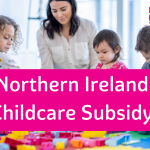A review of the political parties’ manifesto commitments on childcare ahead of next week’s Northern Ireland Assembly elections
Ahead of next week’s Northern Ireland Assembly elections, Employers For Childcare has reviewed each of the party manifestos to identify what commitments are being made specifically in relation to childcare.
This is a critical issue for families, childcare providers, employers and society as a whole. Childcare is a vital part of our economic infrastructure, and a new Childcare Strategy – underpinned by significant investment – is long overdue in Northern Ireland. Getting this right will be key to giving our children the best start in life, supporting parents to get into and stay in work, education and training, and contributing to the economy, at the same time as ensuring childcare providers are sustainable.
Based on our work with parents, employers and childcare providers, Employers For Childcare called for parties to commit to:
- Delivering an ambitious, inclusive and fully funded Childcare Strategy that
- Enables all parents to access and afford high quality childcare
- Supports all childcare providers to deliver quality, accessible childcare sustainability, while investing in their staff and provision
- Ensures all children can benefit from the developmental benefits of quality childcare
- Benefits all employers in helping them to recruit, develop and retain the staff they need.
- Taking action to increase uptake of financial support with registered childcare costs.
The critical role of childcare has gained more prominence in recent years, particularly during Covid-19 – which highlighted its role in keeping the economy going, enabling parents to work and critically, facilitating key workers to continue in their roles. And in recent years, we have seen the establishment of the All Party Group on Early Education and Childcare at Stormont, and commitments to progress on childcare in New Decade, New Approach. So it has been deeply frustrating to see yet another mandate come to a close without a new Childcare Strategy, and without the significant investment that is needed in our childcare infrastructure and to support parents.
So it is essential that, whatever the outcome of the election, we see a new Executive formed without delay that can make investment in childcare a day one priority.
It is positive therefore that many of the parties have recognised the critical importance of childcare, which has been a prominent feature of the election campaign and in the manifestos of most parties, though not all.
Read on for a summary of parties’ commitments in relation to childcare:
Alliance
The Alliance Party references childcare within its manifesto under a range of key policy areas including:
- A shared future, equality and human rights: focusing on the role of childcare in promoting equal opportunities for women
- Climate change and green new deal: recognising childcare workers as key to achieving a green economy
- Economy and skills: reflecting that a green society and economy in which everyone can participate requires universal, child-centred childcare that meets families’ needs, and that childcare is a vital part of our economic infrastructure, which allows parents to work
- Early years and childcare: recognising that early years services and quality childcare are essential for children to have the best start in life.
Acknowledging that childcare provision benefits all of us – parents, carers, employers, communities, and children – Alliance commits to:
- A Childcare Strategy, co-designed and co-produced by stakeholders and professionals
- A fully costed analysis of the resources required to deliver a full time, high quality childcare place
- A universal, affordable childcare scheme with fully funded hours, paid directly to childcare providers
- An awareness campaign to provide families with information on assistance with the cost of childcare
- Movement towards universal full-time provision for all pre-school children and a standardisation of the school day for these children
- Enhancement of early childhood development with a focus on nurturing for pre-school aged settings, including nurture rooms, outdoor learning and play.
You can read more here.
Democratic Unionist Party (DUP)
The DUP has published its five point plan for Northern Ireland, which includes committing to help working families through the delivery of 30 hours free childcare per week for 3 and 4 year olds.
Within a policy document setting out its plans for helping working families, drawing on Employers For Childcare research, the DUP reflects that childcare is one of the most significant household bills faced by families across Northern Ireland, and highlights that Northern Ireland lags behind other UK regions in supporting working families. At the same time, there is recognition that childcare providers are under pressure.
In summary, the DUP is committing to:
- Introducing a childcare strategy as a priority
- Prioritising affordable, flexible, high-quality early education and care initiatives for families with children aged 3-4
- Delivering 30 hours free childcare per week for working families with children aged 3-4
- Engaging with parents and employers to co-design the right model, and support more flexible childcare arrangements, including improving wraparound school provision, and working with the private sector to develop in-house programmes that work for employers and employees
- Pilot projects to deliver better and more accessible rural childcare provision.
You can read more here.
Green Party NI
The Green Party positions its commitments on childcare within policies in relation to jobs and workers. It pledges to:
- Work to address barriers to accessing skills training and apprenticeships, specifically access to childcare
- Promote and encourage employers to implement family and carer-friendly working policies, such as childcare leave, working from home, the right to switch off outside working hours, a day-one right to sick pay, maternity leave, shared parental leave, and paid family leave across all sectors
- Introduce a full childcare strategy that will meet the needs of working parents.
You can read more here.
People Before Profit (PBP)
PBP focuses on the role of childcare in helping to address poverty, particularly child poverty, within Northern Ireland. Reflecting the rising cost of childcare it highlights that the average cost of a full time childcare place in Northern Ireland is now £170 per week, or almost £9,000 per year for one child (figures from Employers For Childcare’s research).
PBP pledges to delivering 30 hours of free, high-quality childcare for working parents. The party compares the current system here, where 3 and 4 year olds are only entitled to 12.5 hours of pre-school education per week – which is not useful for working parents – to England, Scotland and Wales, where parents can access 30 hours a week of free childcare.
You can read more here.
Social Democratic and Labour Party (SDLP)
The SDLP has published an Early Years and Childcare Plan, and emphasises how important the first one thousand days are in a child’s life, recognising early years education as a ‘public good’.
The party pledges to expand the current entitlement to free pre-school education provision for working parents from 12.5 hours to 30 hours free childcare per week. The proposal is aimed at reducing in-work poverty, enabling parents to re-enter the workforce, promoting gender equality and addressing the financial burden that accessing good quality childcare can place on families.
The SDLP plan involves increasing entitlement to free childcare, on a flexible basis, across the working week. It also calls on a new Executive to provide the necessary funding for this immediately, to ensure that families are not penalised further by increasing childcare costs.
SDLP also commits to:
- Enhancing ante-natal support, to give every child support from their first days
- Expanding early years parenting support initiatives for parents of children of 0-2 years
- Developing a world-class early years system to support our workforce, through an Early Learning and Care Strategy.
You can read more here.
Sinn Féin
Sinn Féin uses its manifesto to call for universal childcare, and commits to delivering a childcare strategy to support good quality, affordable childcare in order to support and enhance workers’ rights.
It highlights how childcare responsibilities, and a lack of affordable childcare, can impact on the ability of parents to access further and higher education, and employment.
The delivery of a childcare strategy is recognised as vital to supporting the needs of parents, and ensuring there is a sustainable childcare sector, able to provide a high standard of childcare going forward.
You can read more here.
Traditional Unionist Voice (TUV)
The TUV’s manifesto commits to tackling educational underachievement as its number one educational priority.
You can read more here.
Ulster Unionist Party (UUP)
The UUP has published its plan to ‘Build a Better Northern Ireland’.
The UUP commits to working to remove barriers to women’s participation in employment, through providing accessible, affordable childcare and access to education, training and transport.
You can read more here.
Analysing the commitments
It is clear from the summary above that childcare features more prominently in some party manifestos and plans than in others, with more concrete pledges and commitments.
Broadly there is a recognition from most parties that investment in childcare is needed to support families, and help to make childcare more affordable and accessible. This is linked to supporting parents, and particularly mothers, to be better able to participate in the workforce, and to improved economic outcomes. Some parties go further, also recognising the clear benefits to children of high-quality early education and childcare, and to families through relieving some of the pressure on household budgets.
Positively, several parties have made commitments to delivering on the key asks in Employers For Childcare’s policy manifesto.
30 hours free childcare
While we welcome the pledges from our political parties of greater support for parents with the provision of fully funded childcare, we are cautioning against limiting focus to the introduction of a 30 hours ‘free’ childcare offer only for children aged three to four with working parents, on the basis of the scheme that is available in England. Since its introduction in 2017, many issues have been identified with the implementation of 30 hours free childcare including how the eligibility criteria are targeted, and the significant underfunding of the scheme. These issues have caused difficulties for childcare providers and, in some cases, have actually pushed prices up for parents, or have meant that some children are unable to benefit from provision.
We would also encourage a broader focus than prioritising interventions for children aged 3-4, when we know that the affordability of childcare is an issue for parents with children of all ages. In particular, our own research highlights the risk of increasing costs for parents of younger children, as this can be when childcare is most expensive. Parents who responded to the Northern Ireland Childcare Survey 2021 revealed that the times when it is most difficult to afford the childcare they need to work are when they are returning to work from parental leave, and when their children are aged 0-2 years.
Further detail on learning from the experience of 30 hours free childcare in England is available in our article here. We would encourage all parties to build on the work and evidence gathered to date to develop and target investment and support through a scheme that is bespoke to Northern Ireland, while taking on some of the best parts of what is available elsewhere in the UK, but also in Ireland and in other countries.
Commitments must translate into day one action
It is positive that the importance of childcare has been widely recognised, and is featuring prominently in the election campaign, but looking ahead it is vital that our newly elected MLAs follow through as a matter of urgency, forming an Executive, and delivering real and ambitious investment in childcare. Without concerted action, the fundamental changes that are needed will not happen. Importantly, the delivery of this work must be informed through structured and positive engagement with key stakeholders – parents, childcare providers and employers – who have years of experience and expertise to share.
Through this electoral campaign, we have heard commitments that have the potential to significantly improve:
- The ability of parents to access and afford the childcare they need
- Access to the workforce, for women in particular
- Quality of childcare provision
- Pay and conditions for those working in the childcare sector
- The economic prospects for employers, who are already struggling to recruit and retain the staff they need
- Longer term outcomes for children.
We, and our colleagues across the sector, will continue our efforts to ensure that childcare is urgently recognised, and invested in, as a key public good and a critical component of our economic infrastructure. Employers For Childcare is committed and ready to work with the next Education Minister and their Executive colleagues to develop and deliver a world-leading Childcare Strategy for Northern Ireland that delivers for families, for our economy and for our society as a whole.
Read Employers For Childcare’s policy manifesto here.






